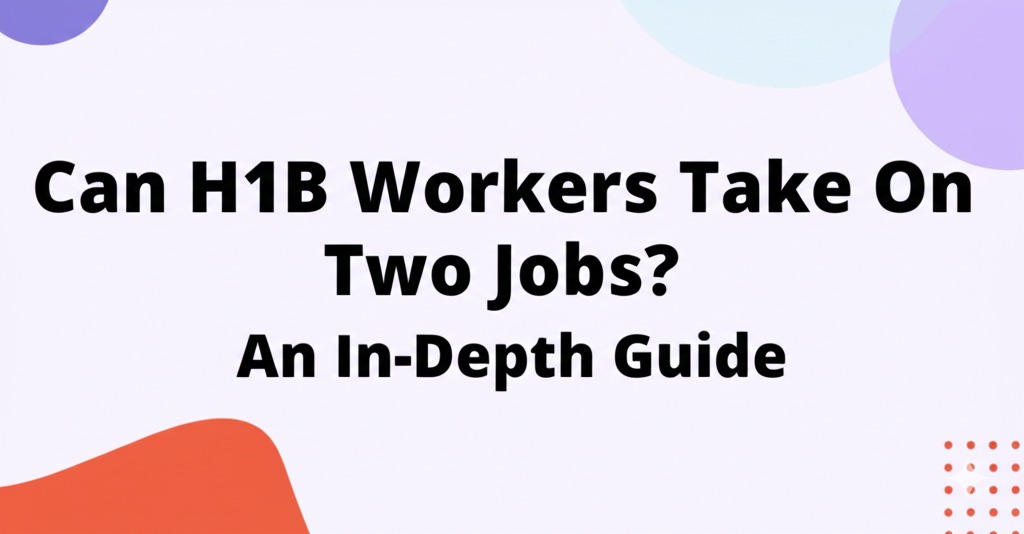
The H1B visa program allows foreign nationals to work in the United States for a temporary period, often in specialized fields like technology, engineering, and medicine. However, a common question among H1B workers is whether they are allowed to take on multiple jobs. With the current state of the U.S. job market, some may wonder if it’s possible to earn extra income or diversify their career by working for more than one employer. In this article, we’ll explore whether H1B workers can take on two jobs, the regulations surrounding this issue, and the potential consequences of breaking the rules.
Understanding the H1B Visa Program
Before we dive into whether an H1B worker can hold multiple jobs, it’s essential to understand the purpose and structure of the H1B visa.
What Is the H1B Visa?
The H1B visa is a non-immigrant visa that allows U.S. companies to hire foreign workers for specific occupations that require specialized knowledge. This visa is typically granted for three years, with the possibility of an extension up to six years. H1B visa holders are allowed to live and work in the U.S., but their employment is tied to a sponsoring employer.
How Does the H1B Visa Work?
An H1B visa holder is expected to work only for the employer who sponsored them. The visa is tied to the specific role and employer outlined in the application. This means that if a worker wishes to switch jobs or take on additional work, the employer must file a petition with the U.S. Citizenship and Immigration Services (USCIS).
Can H1B Workers Take On Two Jobs?
Now that we have a basic understanding of how the H1B visa functions, let’s look at whether H1B workers can hold more than one job.
The Rules Behind Multiple Jobs on an H1B Visa
The short answer is yes, but there are several important stipulations to keep in mind.
- Concurrent Employment is Allowed
The U.S. Department of Labor allows H1B visa holders to work for more than one employer at the same time, but each job must be approved and comply with the visa rules. This is known as “concurrent employment.” However, each employer must submit a separate H1B petition for the worker. Additionally, each job must be in a role that qualifies for H1B status. - Each Employer Must File a Petition
To work two jobs under the H1B visa, both employers must file their own petitions with USCIS. These petitions must detail the nature of the job, the hours, and how they relate to the H1B worker’s qualifications. USCIS must approve both petitions before the worker can legally begin the second job. - Job Roles Must Align with H1B Criteria
Both positions must require specialized knowledge and align with the qualifications of an H1B worker. If one of the jobs does not meet the requirements for the visa, it may not be approved.
Key Considerations for H1B Workers Holding Multiple Jobs
While it’s possible for H1B workers to take on two jobs, several key points need to be addressed to ensure compliance:
- Hours Worked: H1B workers are subject to strict rules regarding their working hours. Employers must ensure that the combined hours from both jobs do not exceed the maximum allowed by immigration regulations.
- Wages: Each employer must pay the H1B worker at least the required wage for the position, and the combined wages from both employers must meet or exceed the prevailing wage for each role.
- Flexibility: The H1B visa doesn’t limit a worker’s ability to change jobs, but any changes in employment must be reported, and the new employer must file a petition with USCIS.
Risks and Challenges of Holding Two Jobs on an H1B Visa
While it’s possible to work multiple jobs under an H1B visa, there are certain risks and challenges that workers should be aware of.
Potential Visa Violations
If the H1B worker fails to comply with the rules, such as working for an unapproved employer or not properly reporting job changes, it could lead to severe consequences, including the loss of their visa status and potential deportation.
Work-Life Balance
Balancing two jobs on an H1B visa can be difficult, particularly when it comes to maintaining a healthy work-life balance. Managing multiple roles could lead to burnout, making it crucial for visa holders to carefully consider whether working two jobs is sustainable in the long term.
How to Ensure Compliance with H1B Regulations
If you’re considering working two jobs on an H1B visa, follow these steps to stay compliant with the regulations.
- Consult with an Immigration Attorney
The H1B visa regulations can be complex. Before seeking a second job, it’s advisable to consult with an immigration attorney who can guide you through the process and help you understand the legal requirements. - Ensure Proper Documentation
Both employers must file an H1B petition with USCIS. Be sure to have proper documentation, such as job offers, contracts, and proof of hours worked, to avoid any complications. - Monitor Job Changes
Any changes to your job, such as changes in duties or pay, must be reported to USCIS. This includes changes in either of your two positions. Failing to do so could result in violations of visa conditions.
Conclusion
In conclusion, H1B visa holders can work two jobs, but it’s essential to follow the proper legal procedures to avoid any potential issues. Concurrent employment is allowed, but each employer must submit a separate petition, and the work must meet the requirements of the H1B visa. Always consult with an immigration attorney to ensure that you’re in full compliance with the regulations, and carefully consider whether balancing multiple jobs is feasible for you in the long run.
If you’re an H1B worker thinking about taking on a second job, make sure to do your research and ensure that you’re abiding by the rules to keep your visa status intact. Ready to explore job opportunities? Start by consulting with your immigration attorney and assessing your options carefully!

Andre Cuevas provides career insights, job search strategies, and professional advice to help individuals navigate the job market and achieve their career goals.





